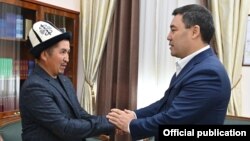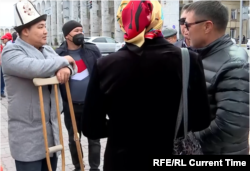One year after the October 2020 popular uprising that pledged to end abuse of power and rampant corruption, many Kyrgyz contend that Kyrgyzstan’s new government, led by President Sadyr Japarov, is no improvement on the old.
The ongoing concentration of power in Japarov’s hands has raised questions about the health of Kyrgyzstan’s democracy. A law passed on October 6 that gives the president the power to appoint regional heads, town mayors, and village elders has added to those concerns.
“We’ve taken a very big and a very bad step backwards ….” commented human rights activist Rita Kharasartova. “All decisions, including on the central and regional level, will depend on one person. You can’t do it this way. Such a big concentration of power will just lead to there not being any development.”
The former head of the Kyrgyz government’s personnel service, Cholponkul Arabaev, however, countered that no one should be surprised that the law increases the president’s power. In April 2021, he noted, Kyrgyzstan voted for a new constitution that re-established a presidential republic. “The president, as the head of state, should be the one playing the violins,” Arabaev said.
A year ago, though, the protesters who brought Japarov to power emphasized that they wanted a more equitable distribution of political influence.
On October 5, 2020, mass protests broke out in the capital, Bishkek, after official preliminary results from the previous day’s elections to the 120-seat lower house of parliament gave a super-majority to two pro-government parties and saw only one consistently anti-government party gain seats. The demonstrations quickly transformed into violent clashes with police in downtown Bishkek, near the parliament building.
Japarov, a 51-year-old nationalist former member of parliament convicted on kidnapping charges, was released from jail by protesters on October 5, and, within days, became the country’s acting prime minister. The election results were thrown out. On October 15, 2020, President Sooranbai Jeenbekov resigned, designating Japarov as acting president.
In January 2021, Japarov was elected president, and, three months later, at the government’s behest, the country adopted a new constitution that restored a presidential republic in Kyrgyzstan.
A March 2021 assessment from the U.S. non-profit Freedom House, a civil rights watchdog, asserted that his proposed constitution “could reshape Kyrgyzstan's political system in the mold of its authoritarian neighbors." The organization downgraded the country’s freedom score to “not free.”
One participant in the 2020 protests, however, does not regret his decision to take to the streets over Kyrgyzstan’s parliamentary election results.
“An important goal lay before us – achieving justice,” said Samat Okmotkulov, whose leg was fractured during the protests by an exploding stun grenade. “Those elections were the last straw.”
A 19-year-old man, Umutbek Altynbek uulu, died from his injuries in clashes with police during the protests and roughly a thousand people were wounded. The Kyrgyz Interior Ministry now deems the police actions criminal.
But the government does not seem inclined to revisit or analyze the events of October 2020. To mark the revolution’s October 5 anniversary, Kyrgyzstan’s new government gave an apartment to Altynbek uulu’s family but did not officially commemorate the protests.
President Japarov restricted himself to written remarks: “The unjust system was bound to collapse sooner or later, and the final and main goal of the people was the overthrow of the irresponsible government that was created on the basis of the Constitution then in force,” reads an address published on his website.
But political scientist Medet Tiulegenov, chairman of the American University of Central Asia’s International and Comparative Politics department, objects that “building a new power vertical has not born any particular fruits for now.”
Protesters wanted not only to throw out the 2020 parliamentary election results, but for the country to make progress with democratization, Tiulegenov said.
“But, unfortunately, what happened during the year, of course, didn’t justify the expectations of either those who went out to the protests or, I’d even say, those who, perhaps, expected eventually something from Japarov’s coming to power and from the people close to him.”
Charges of politicized arrests have dogged the president since his January 2021 election.
In assessments of Japarov’s election and the April 2021 constitutional referendum, international observers criticized a top-heavy political system that does not encourage public dialogue or embrace criticism. Some fear that an anti-fake-news law, which allows the government singlehandedly to shut down websites with “false” or “inaccurate” information, could further hamper free speech.
As often occurs throughout Eurasia, Japarov’s 16 rivals in the presidential election found themselves at a disadvantage for both media coverage and finances, while Japarov made use of administrative resources, the Organization for Security and Cooperation in Europe’s observer mission found.
Japarov won with nearly 80 percent of the vote, while the second-place candidate, Adakhan Madumarov, from the opposition United Kyrgyzstan, received roughly 7 percent.
Parliament, which will see its number of seats shrink from 120 to 90 after repeat elections on November 28, does not seem inclined to argue back. Indeed, a few deputies were caught on camera by journalist Jazgul Masalieva voting for their absent colleagues in support of the October 6 law on presidential appointments for local government.
“The law needs to pass,” commented one of the proxy voters, MP Shailoobek Atazov.
Kyrgyzstan’s parliament still has the same “low-quality makeup that everyone’s sick of,” charged Emil Juraev, an associate professor of politics at the Organization for Security and Cooperation in Europe’s Bishkek academy. “And it’s interesting that this parliament unreservedly supports all the initiatives of the new president, Sadyr Japarov.”
But political analyst Sheradil Baktygulov cautioned that Kyrgyzstan is “now in a transitional period.” After years of “chaos” in Kyrgyzstan’s government, he said, any written specification about who holds what powers is a step forward.
“The fact that there was a change of power, a new president was elected, the fact that they’ll elect new [parliamentary deputies] doesn’t signify that, from the moment there’re new deputies, the system of government administration will run well,” Baktygulov cautioned. For that, he said, laws similar to the one adopted on October 6 are needed.
One former protester, however, is not inclined to be patient. Japarov came into office on promises to fight crime and corruption, and should follow through, commented Syrgak Sakybaev.
“There haven’t been any changes for us because, to this day, the same people are feeding off the government,” charged Sakybaev. “And the ex-president (Jeenbekov) is still feeding himself on the people’s account. They spend millions on him, even though he should be in prison.”
In late August, Jeenbekov, along with ousted ex-President Askar Akaev, was summoned as a witness in an ongoing corruption investigation at the country’s largest profit-producer, the privately owned Kumtor gold mine.
To date, corruption charges related to Kumtor, a property Japarov, as an MP, wanted to nationalize, have led to the detentions of five former prime ministers (Mukhammedkalyi Abylgaziev, Kubanychbek Jumaliev, Omurbek Babanov, Temir Sariev, Joomart Otorbaev). Except for Sariev, all have been released -- in Jumaliev’s case, after paying $12 million in compensation to the treasury for alleged damages.
An equal challenge to Kumtor could lie ahead, though. Declining hydropower has prompted severe electricity restrictions, including plans to shut power off entirely to cities and towns at night, RFE/RL’s Quishlog Ovozi blog reported. Such outages, heading into the winter, conceivably could sour voters on the government in the November parliamentary elections.
One Bishkek clothing seller, however, gave no sign of letting that prospect dampen her faith in Japarov.
"Sadyr has been through a lot. He has lots of good ideas," commented 49-year-old Saira Umetova to AFP. "Only he can lift us up."
-With additional reporting from AFP, Eurasianet.org, and RFE/RL











